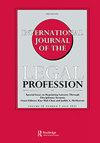Editorial
IF 0.9
Q2 LAW
International Journal of the Legal Profession
Pub Date : 2021-12-26
DOI:10.1080/09695958.2021.2019996
引用次数: 0
Abstract
We open 2022 with a lament on researching the legal profession. Flood’s earlier work on the English Bar set him in the perfect position to report on the “cab rank rule”. Flood sets out the fascinating research undertaken on what appears as a “simple concept intended to be a bulwark of the rule of law”; and the ferocious reaction of the Bar to the ensuing Report. The then chair of the Criminal Bar Association wrote, “Read it and weep”. You will read this and enjoy every moment. Dehaghani and Newman look at the challenges to legal aid criminal defence lawyers in South Wales, UK, through the prism of “resilience” of both lawyers and clients. They argue that undermining criminal defence increases the resilience of the prosecution and could set an imbalance in the justice system. Schultz discusses the role of women lawyers in arbitrations in Germany where such work had long been confined to men. “Women’s voice”, “report talk vs. rapport talk”, different gender approaches, the need for women in negotiations, the horizontal segregation of women into different professional work are mentioned against the background of gender inequality in the upper reaches of the profession. The need to reach a critical mass of 30% participation is assisted by creative networks, “women’s events” and growing awareness of disparity. Dawuni portrays the development of the legal profession in Ghana from the establishment of the first Law School in 1958. Seen through the eyes of some 30 interviewees, whilst detailed background data are as yet unavailable, the periods of colonisation, indigenisation, professionalisation and globalisation are discussed to show the changing dynamics in the profession. Quartey et al. provide research on how clients react to the competence of female lawyers in Ghana. Matching law firms’ concepts of competence with clients’ satisfaction with lawyers provides a well-known dichotomy. Quartey et al. stretch this complexity to how clients perceive the competence of female lawyers through “gender schemas”, arguing for better work–life balance and that law firms should use client perceptions more in assessing competence.编辑
我们以对法律职业研究的哀叹开启2022年。弗洛德早期在英国酒吧的工作使他在报道“出租车等级规则”方面处于完美的位置。弗拉德阐述了他对一个看似“旨在成为法治堡垒的简单概念”所进行的引人入胜的研究;以及律师公会对随后的报告的激烈反应。当时的刑事律师协会主席写道:“读了就哭吧。”你会读到这篇文章并享受每一刻。Dehaghani和Newman通过律师和客户的“弹性”来审视英国南威尔士法律援助刑事辩护律师所面临的挑战。他们认为,削弱刑事辩护会增加起诉的弹性,并可能在司法系统中造成不平衡。舒尔茨讨论了女律师在德国仲裁中的作用,在德国,这类工作长期以来仅限于男性。在职业上层性别不平等的背景下,提到了“女性的声音”、“报告论vs.融洽论”、不同的性别方法、女性在谈判中的必要性、女性进入不同专业工作的横向隔离。创造性的网络、“妇女活动”和对差距的日益认识有助于达到30%的临界质量参与率。达乌尼描绘了自1958年第一所法学院成立以来加纳法律职业的发展。通过大约30位受访者的眼睛,虽然详细的背景数据尚未获得,但殖民化,本土化,专业化和全球化的时期进行了讨论,以显示该行业不断变化的动态。Quartey等人提供了关于加纳客户对女律师能力的反应的研究。将律师事务所的能力概念与客户对律师的满意度相匹配提供了一个众所周知的二分法。Quartey等人将这种复杂性延伸到客户如何通过“性别图式”来看待女律师的能力,他们认为应该更好地平衡工作与生活,律师事务所应该更多地利用客户的看法来评估能力。
本文章由计算机程序翻译,如有差异,请以英文原文为准。
求助全文
约1分钟内获得全文
求助全文

 求助内容:
求助内容: 应助结果提醒方式:
应助结果提醒方式:


